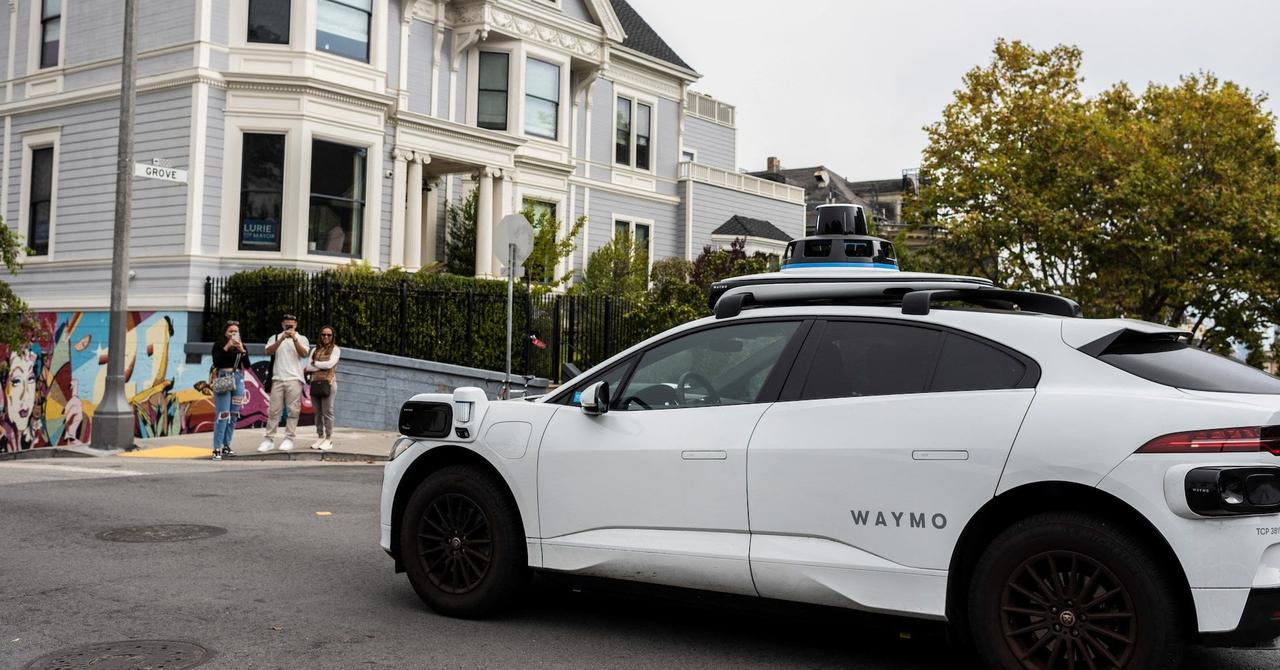Waymo's Privacy Dilemma: Interior Camera Data, AI Training, and Ad Personalization
9 Sources
9 Sources
[1]
Waymo may use interior camera data to train generative AI models, sell ads | TechCrunch
Waymo is preparing to use data from its robotaxis, including video from interior cameras tied to rider identities, to train generative AI models, according to an unreleased version of its privacy policy found by researcher Jane Manchun Wong. The draft language reveals Waymo may also share this data to personalize ads, raising fresh questions about how much of a rider's behavior inside autonomous vehicles could be repurposed for AI training and marketing. The privacy page states: "Waymo may share data to improve and analyze its functionality and to tailor products, services, ads, and offers to your interests. You can opt out of sharing your information with third parties, unless it's necessary to the functioning of the service." That language is standard in today's world; bringing cameras into the mix is what ratchets up the creepiness factor. Waymo gives riders the option to prevent their personal information, as defined by California's privacy laws, from being shared or sold. Riders can also: "Opt out of Waymo, or its affiliates, using your personal information (including interior camera data associated with your identity) for training [generative AI]." It's not clear what interior data might be used to train generative AI models, or what the intended use cases of such models are. Nor is it obvious what sort of data the interior cameras capture - facial expressions? Body language? - or whether Waymo is using the data to train in-house models or whether it's sharing that data with other Alphabet companies working on AI like Google or DeepMind. TechCrunch has reached out to Waymo for more information and will update this post if the company responds. Waymo is, to date, the only autonomous vehicle company pulling in revenue for robotaxi rides in the United States. As of February, the company is logging more than 200,000 paid robotaxi rides every week via its commercial services in Los Angeles, San Francisco, Phoenix, and Austin. That's up from 10,000 rides per week just two years ago, and is a harbinger of more growth as Waymo expands into new markets. The company aims to launch a commercial service in Atlanta, Miami, and Washington D.C. over the next two years. Despite these gains, Waymo is still likely a money loser for Alphabet, which might be why the company appears to be exploring other revenue streams, like in-vehicle advertising and data sharing for generative AI models. Last year, Alphabet poured another $5 billion into Waymo, and the company raised an additional $5.6 billion from outside investors that boosted its valuation to more than $45 billion. Waymo is still investing heavily in R&D and incurring the costs of expansion, including growing its fleet, buying specialized equipment, vehicle maintenance, and charging infrastructure. It's not clear how far Waymo is from breaking even, much less profitability. Alphabet doesn't break out Waymo's financials in its earnings report. Instead, Waymo is included in Alphabet's "other bets" section of its balance sheet, which in 2024 recorded an operating loss of $1.2 billion.
[2]
Waymo may use interior camera data to train generative AI models, but riders will be able to opt out
Waymo is preparing to use data from its robotaxis, including video from interior cameras tied to rider identities, to train generative AI models, according to an unreleased version of its privacy policy found by researcher Jane Manchun Wong, raising fresh questions about how much of a rider's behavior inside autonomous vehicles could be repurposed for AI training. The draft language also reveals Waymo may also share rider data to personalize ads. This isn't new; Waymo already collects personal data to improve services and for advertising purposes, per its existing privacy policy. What will change when this feature is released is that riders will have an opportunity to "opt out" of having their personal information sold, shared, or used for AI training. "The feature, which is still under development, will not introduce any changes to Waymo's Privacy Policy, but rather will offer riders an opportunity to opt out of data collection for [machine learning] training purposes," Julia Ilina, a Waymo spokesperson, told TechCrunch. The unreleased privacy page states: "Waymo may share data to improve and analyze its functionality and to tailor products, services, ads, and offers to your interests. You can opt out of sharing your information with third parties, unless it's necessary to the functioning of the service." That language is standard in today's world; bringing cameras into the mix is what ratchets up the creepiness factor. "Opt out of Waymo, or its affiliates, using your personal information (including interior camera data associated with your identity) for training [generative AI]," reads the draft language of the unreleased page. Ilina noted that Waymo uses personal data to train AI models for safety, make sure cars are clean, find lost items, provide help in case of emergency, check that in-car rules are being followed, and generally improve products and services. "Any data Waymo collects will adhere to the Waymo One Privacy Policy," Ilina said. "That policy explicitly states Waymo will not share personal information we collect through our products and services with other Alphabet companies for them to use for any purpose other than: with a users' consent, in connection with providing services to Waymo, or as otherwise described in the Privacy Policy's sharing section." Other Alphabet companies working on AI include Google and DeepMind. When asked whether Waymo will alert riders about the ability to opt out when the feature is live, or whether users will have to hunt through the app to find it themselves, Ilina said the company has not yet finalized its notification or deployment plans. Waymo is, to date, the only autonomous vehicle company pulling in revenue for robotaxi rides in the United States. As of February, the company is logging more than 200,000 paid robotaxi rides every week via its commercial services in Los Angeles, San Francisco, Phoenix, and Austin. That's up from 10,000 rides per week just two years ago and is a harbinger of more growth as Waymo expands into new markets. The company aims to launch a commercial service in Atlanta, Miami, and Washington, D.C., over the next two years. Despite these gains, Waymo is still likely a money loser for Alphabet, which might be why the company appears to be exploring other revenue streams, like in-vehicle advertising and data sharing for generative AI models. Last year, Alphabet poured another $5 billion into Waymo, and the company raised an additional $5.6 billion from outside investors that boosted its valuation to more than $45 billion. Waymo is still investing heavily in R&D and incurring the costs of expansion, including growing its fleet, buying specialized equipment, vehicle maintenance, and charging infrastructure. It's not clear how far Waymo is from breaking even, much less profitability. Alphabet doesn't break out Waymo's financials in its earnings report. Instead, Waymo is included in Alphabet's "other bets" section of its balance sheet, which in 2024 recorded an operating loss of $1.2 billion.
[3]
Waymo: 'no plans' to use in-car camera data for targeted ads
Andrew J. Hawkins is transportation editor with 10+ years of experience who covers EVs, public transportation, and aviation. His work has appeared in The New York Daily News and City & State. Waymo has "no plans" to use footage from cameras inside its robotaxis to train AI models for targeted ads, spokesperson Julia Ilina said in an email to The Verge. Ilina was responding to an unreleased page from Waymo's privacy policy that appears to offer customers the ability to opt-out from having their "personal information," including "interior camera data associated with rider's identity," to train generative AI models for a variety of purposes, including advertisements. The snippet from the privacy policy was discovered by security researcher Jane Manchun Wong, who previously found Waymo's plans for a tipping feature. The screenshot posted by Wong was from an unreleased app page that "contains placeholder text that doesn't accurately reflect the feature's purpose," Ilina cautioned. "The feature, which is still under development, will not introduce any changes to Waymo's Privacy Policy, but rather will offer riders an opportunity to opt out of data collection for ML training purposes," she continued. Waymo's robotaxis, which currently operate in San Francisco, Los Angeles, Phoenix, and Austin, feature in-cabin cameras that watch customers while they're out on the road by themselves in the vehicles. Essentially, Waymo is keeping an eye on their customers to make sure they're safe, while also monitoring the safety and upkeep of the vehicle itself. The company uses the live feeds to track lost property, monitor the vehicle's cleanliness, and make sure that customers are following the rules for riding in a robotaxi. "Waymo's [machine learning] systems are not designed to use this data to identify individual people, and there are no plans to use this data for targeted ads," Ilina said. But increasingly tech companies are hungry for any and all data to train their voracious generative AI models as they attempt build more chatbots and image generators. Waymo is owned by Alphabet, which also oversees Google and its Gemini products. And Waymo uses generative AI for its own research and development, as noted in this blog post from last year. It's understandable that questions around privacy and data usage would come up eventually for Waymo. And most customers would reject any attempt to use their likeness without permission to train AI models aimed at selling them stuff. Which, thankfully, Waymo says it has no plans to do. And if any of that changes, it's good that they're offering people the option to opt-out. Let's hope it stays that way.
[4]
Waymo may use in-cabin camera footage to train AI.
Security researcher Jane Manchun Wong has discovered another hidden Waymo gem, this time related to the robotaxi operator's use of footage from its interior cameras to train generative AI. According to a screenshot of an unreleased privacy policy, Waymo is offering customers the opportunity to opt-out from having their "personal information," including "interior camera data associated with your identity," to train generative AI models. Waymo uses this data to "tailor products, services, ads, and offers to your interests." Coming soon to a robotaxi near you?
[5]
Waymo has 'no plans' to sell ads to riders based on camera data
The company claims a datamined privacy policy contained "placeholder text." Rumors circulated today that robotaxi company Waymo might use data from vehicles' interior cameras to train AI and sell targeted ads to riders. However, the company has tried to quell concerns, insisting that it won't be targeting ads to passengers. The situation arose after researcher and engineer Jane Manchun Wong an unreleased version of Waymo's privacy policy that suggested the robotaxi company could start using data from its vehicles to train generative AI. The draft policy has language allowing customers to opt out of Waymo "using your personal information (including interior camera data associated with your identity) for training GAI." Wong's discovery also suggested that Waymo could use that camera footage to sell personalized ads to riders. Later in the day, The Verge comments on this unreleased privacy policy from Waymo spokesperson Julia Ilina. "Waymo's [machine learning] systems are not designed to use this data to identify individual people, and there are no plans to use this data for targeted ads," she said. Ilina said the version found by Wong featured "placeholder text that doesn't accurately reflect the feature's purpose" and noted that the feature was still in development. It "will not introduce any changes to Waymo's Privacy Policy, but rather will offer riders an opportunity to opt out of data collection for ML training purposes." Hopefully Waymo holds to those statements. Privacy and security are huge concerns as AI companies try to feed their models as much information as possible. Waymo is owned by Alphabet and Google is developing its own AI assistant, , as well as other AI projects with its division.
[6]
Waymo responds to reports of using vehicle interior cameras for targeted ads
A hot potato: There were worrying reports yesterday that Waymo is considering using footage from its vehicles' interior cameras to train AI models and sell ads to riders. Now, the robotaxi company has responded, announcing that it has "no plans" to use the data for targeted ads. Researcher Jane Manchun Wong wrote in an X post that, according to an unreleased version of its privacy policy, Waymo is working on generative AI training using interior camera data associated with a rider's identity. The policy page also states that Waymo may share rider data to tailor products, services, ads, and offers to customer interests. Targeted ads, basically. One of the page toggles is to opt out of Waymo, or its affiliates, using your personal information, including interior camera data associated with your identity, for training generative AI. The page offers opt-outs for this practice and data sharing to comply with California's privacy law, CCPA, which allows residents to access and delete any of their data that may have been collected. Unsurprisingly, the idea that Waymo could be using cameras inside vehicles to train AI and sell targeted ads to riders has not gone down well. The cameras are inside the robotaxis to ensure both riders and the vehicles themselves are safe. A live feed is used to track lost property, make sure the vehicles are clean, and check that customers are following the rules for riding in the autonomous cars. Soon after TechCrunch reported on the post, Waymo spokesperson Julia Ilina gave a statement to The Verge. "Waymo's [machine learning] systems are not designed to use this data to identify individual people, and there are no plans to use this data for targeted ads," she said. Ilina added that the "placeholder text" Wong found does not accurately reflect the feature's purpose, and that the feature is still in development. It "will not introduce any changes to Waymo's Privacy Policy, but rather will offer riders an opportunity to opt out of data collection for ML training purposes." There has been a lot of controversy over AI companies using data without permission to train their models - Waymo is owned by Alphabet, which is also the parent of Gemini and DeepMind owner Google. It's an even more contentious subject when that data is a person's likeness captured by cameras as they ride in a robotaxi, even if it is anonymized. Thankfully, it appears that customers can opt out of this practice.
[7]
Waymo Considering Using In-Vehicle Cameras to Sell Ads and Train Its AI
The privacy risks posed by the artificial intelligence industry are slowly coming into view. Alphabet's robotaxi business, Waymo, says it may use videos of passengers captured by in-vehicle cameras to sell ads and train its AI models. TechCrunch reports that the unreleased policy was originally spotted by reliable software researcher Jane Manchun Wong, who posted about it on X on Saturday. A screenshot provided by Wong shows the terms of use that the robotaxi company plans to ask riders to comply with. An opt-out option is provided to comply with California's privacy law. It's not entirely clear how Wong was able to access the new policy that hasn't been shared publicly but Wong is known for digging through companies' software and finding unreleased updates. The screenshot of the policy states: “Waymo may share data to improve and analyze its functionality and to tailor products, services, ads, and offers to your interests. You can opt out of sharing your information with third parties, unless it’s necessary to the functioning of the service.†Wong has noted that the new policy will have an opt-out option for California riders, to comply with the California Consumer Privacy Actâ€"one of the only comprehensive state privacy laws in the country. The CCPA allows residents to access and delete data that has been collected about them. "Opt out of Waymo, or its affiliates, using your personal information (including interior camera data associated with your identity) for training GAI," the screenshot. As TechCrunch notes, it's not entirely clear what sort of data would be collected or used by the company. Gizmodo reached out to Waymo for more information. Waymo has become one of the most successful robotaxi companies on the market. With the swift implosion of its core competitor Cruise (which is owned by GM), Waymo has become the dominant player in California's self-driving car industry. Waymo, which is currently operational in a handful of cities across the country, recently partnered with Uber, signaling an expansion of services. Other companies, including Elon Musk's Tesla, have also gestured at future plans to launch robotaxi servicesâ€"although none have enjoyed Waymo's level of success yet.
[8]
Waymo faces questions about its use of onboard cameras for AI training, ads targetting
In an iconic scene from the 2002 sci-fi film Minority Report, on-the-run Agent John Anderton, played by Tom Cruise, struggles to walk through a mall as he's targeted by a multitude of personalized ads from the likes of Lexus, Guinness and American Express, everytime hidden detectors identify his eyes. It was clearly meant as a warning about a not-so-desirable dystopian future. Recommended Videos Yet, 23 years later that future is at least partlially here in the online world and threatens to spread to other areas of daily life which are increasingly 'connected', such as the inside of cars. And the new testing grounds, according to online security researcher Jane Manchun Wong, might very well be automated-driving vehicles, such as Waymo's robotaxis. On X, Wong unveiled an unreleased version of Waymo's privacy policy that suggests the California-based company is preparing to use data from its robotaxis, including interior cameras, to train generative AI models and to offer targetted ads. "Waymo may share data to improve and analyze its functionality and to tailor products, services, ads, and offers to your interests," the Waymo's unreleased privacy statement reads. "You can opt out of sharing your information with third parties, unless it's necessary to the functioning of the service." Asked for comments about the unreleased app update, Waymo told The Verge that it contained "placeholder text that doesn't accurately reflect the feature's purpose". Waymo's AI-models "are not designed to use this data to identify individual people, and there are no plans to use this data for targeted ads," spokesperson Julia Ilina said. Waymo's robotaxis, which are operating on the streets of San Francisco, Los Angeles, Phoenix and Austin, do contain onboard cameras that monitor riders. But Ilina says these are mainly used to train AI models for safety, finding lost items, check that in-car rules are followed, and to improve the service. The new feature is still under development and offers riders an opportunity to opt out of data collection, Ilina says. But as we all get used to ads targeting based on everything that's somehow connected to the web, it seems a once-distant vision of the future may be just around the corner.
[9]
Waymo Denies Plan to Use Robotaxis' Interior Cameras to Personalize Ads | PYMNTS.com
Autonomous vehicle firm Waymo denied a media report that it plans to use data from its robotaxis' interior cameras to identify individuals or personalize ads. The company's statement to PYMNTS came in response to a Monday (April 7) TechCrunch report that said Waymo may use interior camera data from its robotaxis, tied to riders' identities, to train generative artificial intelligence (AI) models and sell personalized ads. The TechCrunch reported cited a post on X from researcher Jane Manchun Wong, who said an unreleased privacy page from Waymo said the company may use the data for those purposes, while also allowing riders to opt out. The privacy page said, per the TechCrunch report: "Waymo may share data to improve and analyze its functionality and to tailor products, services, ads, and offers to your interests. You can opt out of sharing your information with third parties, unless it's necessary to the functioning of the service." When reached by PYMNTS for comment on the report, Waymo said in an emailed statement that the unreleased app page "contains placeholder text that doesn't accurately reflect the feature's purpose." The company added that the feature is still under development, that it doesn't introduce any changes to the company's privacy policy, and that it will give riders the opportunity to opt out of data collection for machine learning (ML) training purposes. "The data is used among other things, to train models for safety, to make sure cars are clean, find lost items, provide help in case of emergency, check that in-car rules are being followed and improve products and services," the Waymo statement said. "Waymo's ML systems are not designed to use this data to identify individual people, and there are no plans to use this data for targeted ads." Waymo said in March that it had begun offering rides in autonomous vehicles in Austin, Texas, and that the vehicles have already driven millions of miles in the company's core markets of San Francisco, Phoenix and Los Angeles. The company's cars operate at Level 4, where the car can drive itself but is restricted to an area, according to a definition of autonomous levels by the National Highway Traffic Safety Administration.
Share
Share
Copy Link
Waymo, the autonomous vehicle company, faces scrutiny over potential plans to use interior camera data for AI training and ad personalization, sparking privacy concerns and prompting clarifications from the company.

Waymo's Potential Data Usage Sparks Privacy Concerns
Waymo, Alphabet's autonomous vehicle subsidiary, has found itself at the center of a privacy controversy following the discovery of an unreleased version of its privacy policy. Security researcher Jane Manchun Wong uncovered language suggesting that Waymo might use data from interior cameras in its robotaxis to train generative AI models and potentially personalize advertisements for riders
1
.The Controversial Draft Policy
The draft policy stated that Waymo may share data to "improve and analyze its functionality and to tailor products, services, ads, and offers to your interests." It also mentioned an option for riders to "opt out of Waymo, or its affiliates, using your personal information (including interior camera data associated with your identity) for training [generative AI]"
2
.Waymo's Response and Clarifications
In response to the growing concerns, Waymo spokesperson Julia Ilina provided clarifications:
- The discovered page contained "placeholder text" that doesn't accurately reflect the feature's purpose
3
. - The company has "no plans" to use footage from interior cameras for targeted ads
3
. - The feature under development will offer riders an opportunity to opt out of data collection for machine learning training purposes
2
.
Current Data Usage and Privacy Measures
Waymo already collects personal data to improve services and for advertising purposes, as per its existing privacy policy. The company uses interior camera data for various purposes, including:
- Ensuring vehicle cleanliness
- Locating lost items
- Providing emergency assistance
- Verifying compliance with in-car rules
- Improving products and services
2
Related Stories
Waymo's Growth and Financial Situation
Despite the privacy concerns, Waymo continues to expand its operations:
- As of February 2025, Waymo is logging over 200,000 paid robotaxi rides weekly across Los Angeles, San Francisco, Phoenix, and Austin.
- The company plans to launch commercial services in Atlanta, Miami, and Washington D.C. within the next two years
1
.
However, Waymo is likely still operating at a loss. In 2024, Alphabet's "other bets" section, which includes Waymo, recorded an operating loss of $1.2 billion
1
.The Broader Context of AI and Data Privacy
This incident highlights the growing tension between data collection for AI advancement and user privacy. As companies like Waymo, owned by AI-focused Alphabet, seek to improve their services and potentially monetize data, they must navigate complex ethical and regulatory landscapes
5
.The situation underscores the need for clear communication about data usage policies and the importance of providing users with control over their personal information in an increasingly AI-driven world.
References
Summarized by
Navi
[1]
[2]
[4]
Related Stories
Alphabet's Waymo Considers Personal Ownership of Robotaxis, Challenging Tesla's Autonomous Vehicle Strategy
25 Apr 2025•Technology

Waymo Robotaxi Malfunction Traps Passenger in Dizzying Loop, Raising Concerns About AI-Driven Transportation
06 Jan 2025•Technology

Automotive AI turns cars into companions at CES, raising data privacy questions
07 Jan 2026•Technology

Recent Highlights
1
EU launches formal investigation into Grok over sexualized deepfakes and child abuse material
Policy and Regulation

2
Google Chrome AI launches Auto Browse agent to handle tedious web tasks autonomously
Technology

3
AI agents launch their own social network with 32,000 users, sparking security concerns
Technology





